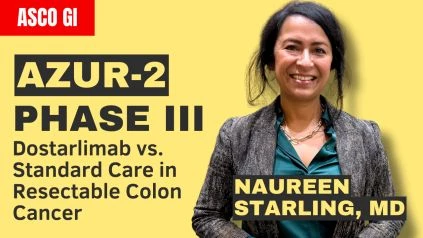Naureen Starling, MD: [00:00:00] Of course. So AZUR-2, as you said, is a global study. Open label, randomized, running in over 245 centers in over 26 countries globally. So a global study and patients. So 711 participants will be recruited with DMMR or MSI high. Resectable colon cancer stay with a clinical stage of T four N zero or stage three.
And that’s by clinical staging. And participants will be randomized on a two to one basis between the experimental arm versus the control arm. And in the experimental arm, participants randomized to that arm will have neoadjuvant doss, which is anti PD one therapy as monotherapy. for three months.
That’s for three weekly cycles, followed by surgery, followed by six, six weekly cycles of Dostalimab postoperatively. So a perioperative, [00:01:00] uh, approach. In the control arm participants randomized to that arm will go straight to surgery followed by standard of care. therapy which it will be chemotherapy, which could be platinum Kapox, or indeed observation as per the investigator discretion.
And then follow up will occur, survival follow up will occur every six months from the date of surgery to the date that the last patient has completed follow up. So we envisage. that the study will be fully recruited by around 2028 with a readout around 2030.
OncologyTube: Excellent. Can you elaborate on the potential advantages of using perioperative dose toleramab monotherapy in the treatment of resectable colon adenocarcinoma, specifically in patients with DD MMR MS high status?
And how might this approach differ from the standard of care?
Naureen Starling, MD: As you will know the treatment of early stage colon cancer involves [00:02:00] a combination of chemotherapy surgery and chemotherapy, and that includes the DMMR MSI subgroup of patients which account for somewhere between 10 to 15 percent of patients with resectable colon cancer.
Now, we know that neoadjuvant immunotherapy appears to be promising with a high signal of efficacy. And so in the as or to study weeks, then that further put to a Perry operative approach, which we think could confer additional survival advantages, which would be really transformative for patients in terms of potentially displacing chemotherapy with A a more targeted agent, which is actually very well tolerated.
We know that from the metastatic disease setting, Dostal has proven efficacy in MET DMMR or MSI, high metastatic colorectal cancer. That’s from the Garnet study. And we also see a good efficacy and good tolerability in the treatment of DMMR locally advanced rectal cancer. And that [00:03:00] was the Andrea CEREC data.
OncologyTube: Okay, how will event free survival be assessed in this study and what are the expected outcomes or endpoints that will determine the efficacy and safety of perioperative doztolomab compared to standard of care and resectable colon adenocarcinoma patients?
Naureen Starling, MD: The primary efficacy endpoint of the ASO2 study is event free survival.
An event free survival will be centrally assessed by blinded independent central review. The events that comprise event free survival include recurrence by independent review, recurrence as assessed by pathological assessment, progressive disease that precludes surgery, death, or treatment related toxicity that precludes surgery.
So that’s the definition of event free survival. In addition, there are secondary endpoints which include overall survival event free survival by investigator assessment. We will also be [00:04:00] looking at important additional endpoints, quality of life, health related outcome measures, and exploratory biomarker endpoints as well.
OncologyTube: Alright, could you discuss the importance of exploring patient reported outcomes to evaluate health related quality of life as an exploratory endpoint in the AZER2 study and how might these findings influence treatment decisions in patient care in the future?
Naureen Starling, MD: Yeah we had this morning, actually, a very nice talk from the FDA about meaningful clinical endpoints that are impactful for patients.
And that includes efficacy and living longer, surviving, but it also includes patient related outcome measures safety, tolerability. These are key endpoints within the as or two study. And I think that’s really important, particularly as we’re looking to replace conventional chemotherapy, we know a lot about the side effects and the quality of life with chemotherapy in the adjuvant setting.
With a personalized, targeted approach, immunotherapy, which again, as I mentioned earlier, appears to be a very well [00:05:00] tolerated treatment. So I think this is really key in terms of understanding not only the survival benefits, but also the patient related outcome measures and what it means to a patient.
Really a very important end point.
OncologyTube: Okay, this has been an interview with Dr. Noreen Starling, medical doctor, consultant, medical oncologist at the Royal Marsden NHS Foundation Trust, specializing in treatment of gastrointestinal cancers out of London, England. Dr. Starling, thank you so much for taking the time today.
Thank you.

